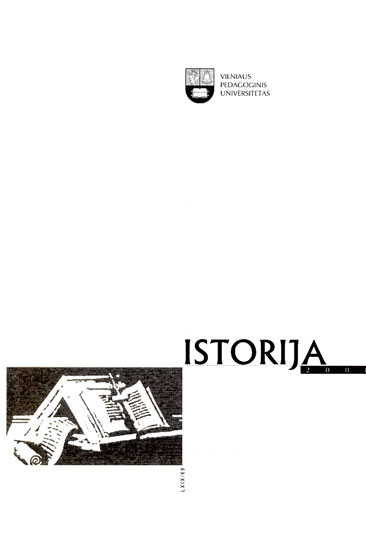Sentikių Bažnyčia Lietuvoje vokiečių okupacijos metais (1941-1944)
The Church of Old Believers in Lithuania during the Nazi Occupation
Author(s): Regina LaukaitytėSubject(s): History
Published by: Vytauto Didžiojo Universitetas
Summary/Abstract: The article analyses such issues of Lithuania's Old Believers church in 1941-1944 as functioning of its spiritual government and the role and position of its leaders. The major problems that the Old Believers church faced in 1941-1944 were the restoration of its spiritual government, its relationship with the occupation Nazi power and Lithuanian selfgovernment. The Old Believers were viewed suspiciously by both the Lithuanian and German authorities because of their sympathy for the Soviet partisans. The whole villages of Old Believers suffered from mass repressions - buildings were burnt, people killed, priests among them. After the repressions of the Soviet power, the Old Believers church remained the only religiuos community without central government. In Lithuania there were 74 of such parishes with 66,720 Russian Old Believers. During the Nazi occupation such government was formed; the Central Council of Old Believers (CCOB) was established in Kaunas on March 5, 1942. We have little information about its members and Chairman Borisas Leonovas because up to that period they did not participate actively in the governing of the established by the representatives from different parishes. Its Chairman became Borisas Pimonovas, a wellknown Polish personality. The High Council consisted of 15 members; seven of them were closely connected with the church's activities in pre-war Lithuania, eight - Poland. The church was supposed to function on the basis of the Polish Old Believers Charter. This idea is attributed to B. Pimonovas. The occupation power used this church for its political purposes and propaganda. In 1943 the Bureau for the affairs of people of Russian nationality was established in Kaunas; among its members were many Old Believers and Orthodox priests. This governing body explicitly demonstrated its loalty to the occupation power, encouraging young people to join the German army and police forces. This position was in opposition to the majority of community members, who adhered to proSoviet ideas. In reality, ordinary members of this community had no reasons to sympathize either with the German or Soviet powers. They simply were intimitaded because of the rumour that Old Believers might be deported to special camps or used as a labour force in Germany. In other words, local people were hostages of the then occupation power, and legally functioning governing bodies, CCOB and the High Council among them, had to obey the orders of that power.
Journal: Istorija. Lietuvos aukštųjų mokyklų mokslo darbai
- Issue Year: 69/2008
- Issue No: 1
- Page Range: 33-41
- Page Count: 9
- Language: Lithuanian

